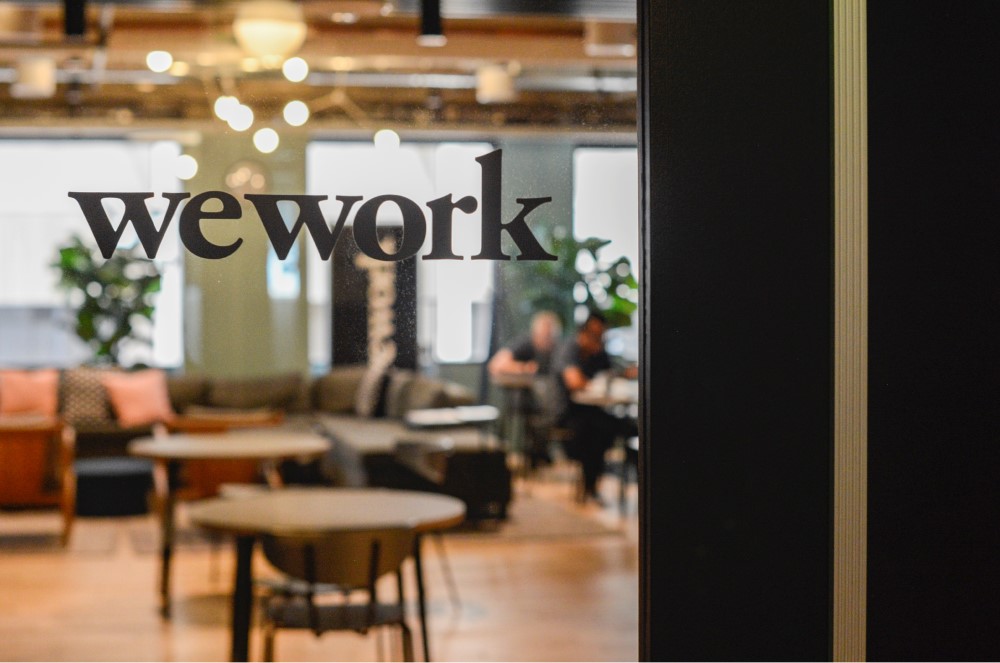WeWork Story: Phenomenal Rise & Fall of The Once-Heralded Unicorn
Transforming the boring, shared-office-space concept, added kombucha on tap and the allure of working into a cool, hip, aesthetically pleasing environment, WeWork used to be one of the most highly valued unicorn companies, reaching a reported peak valuation of staggeringly $47 billion. Beyond any doubt, the company experienced a great run of success, quickly opening new locations globally and preparing to take over the world.
Then, investment bankers vigorously competed to bring the company public, which thrust WeWork into the limelight and consequently revealed large cracks in its facade. The issues – once disclosed – crushed the company with the sky-high $47 billion valuation to the cancellation of IPO filing and nearly the verge of bankruptcy.
The wild story of WeWork, the once-heralded unicorn now under the microscope, undeniably has received much public attention and stands out as a cautionary tale worth noting for future entrepreneurs.
WeWork Story: Brief Background
Before going into great length of WeWork’s “disaster”, it’s essential to first take a brief look over WeWork as well as its flying start with staggeringly $14.2 billion in venture capital.
The idea of co-working has been around since the 90s and had been growing in popularity since 2005. Riding on this wave, WeWork was founded in 2010, emerging as a commercial real estate company that rents funky, state-of-the-art coworking office space to freelancers, small business owners, and even tech giants, offering fledgling and established businesses alike functional premises from which to operate and network. What made the company popular right from the start was their ability to tap into the market and sell an idea: the open spaces and collaborative areas it offered didn’t look or feel like a traditional office; they focused on community, drawing from their founders’ experiences of growing up in communal living spaces. Additionally, WeWork framed themselves as a tech company, leveraging data analytics tools and other smart tech to improve the efficiency of their spaces, which led to an understanding of exactly how people use their spaces, where to build next and how the spaces should look!

When it comes to capital investment, the company received some big backing from major investors such as Goldman Sachs, JP Morgan, Softbank and even Amazon. In total, WeWork secured whoppingly 14.2 billion dollars in funding since 2009. Remarkably, in 2017, Masayoshi Son, the CEO of SoftBank, made an investment decision of $4.4 billion in WeWork after a 12-minute meeting with WeWork CEO Adam Neumann. Son, an investment guru who has previously invested venture capital with the likes of Alibaba, encouraged Neumann to “think big”. Masayoshi Son “had found a new apprentice in Adam Neumann, and in Son, Neumann had found a mentor. But Son’s belief in Neumann, while it gave way to his rise, may also have been part of the reason for his eventual downfall.”
In the milieu of the sharing economy, WeWork’s basic business concept has broad appeal. Over the coming decades, the company quickly grew to encompass 847 locations in 123 cities worldwide. In both London and Manhattan, WeWork stands out as the largest private renter of commercial office space.
Nonetheless, Adam Newman harbored bigger dreams for the company than just renting office spaces. Rebranding as The We Company along with WeWork is also WeLive, a service that leases cutting-edge furnished apartments, and WeGrow, an experimental private school with astronomical tuition fees.
Notwithstanding the global expansion and the apparent success of the company, there was an air of doubt around it: WeWork hadn’t made a profit yet. In fact, following Uber’s IPO in May 2019, WeWork became the most highly valued private company in the United States, worth an estimated $47 billion. Whereas it’s not uncommon for a tech company to take a while to generate profit stream, WeWork – although Neumann framed it as a tech venture – really isn’t. Actually, WeWork doesn’t sell hardware or software. The company does leverage data analytics to improve its operations, as do many enterprises, but it isn’t in the tech business. WeWork is essentially a landlord and will never achieve the explosive growth of a tech giant – and therein lies the main problem with WeWork: How would the landlord company be supposed to yield handsome returns and impressive growth like that of a tech company?
WeWork Story: Unsettling Discrepancies Getting Noticed
The Inherently Risky Business Model
One major reason that investors began to look critically at WeWork was that there was an obvious and inherent risk with the company’s business model. WeWork engages in long-term leases of 15 years on average with landowners and pays a fixed price each year while subletting those spaces to occupants. As long as rents are robust and property prices rise, WeWork can remain afloat. But, if property prices dip or rentals fall off, WeWork must charge occupants lower rents in order to fill its office spaces yet continue to pay the agreed-upon lease price – hence, the company would be bleeding money.
Should another property bust unfold, fewer people would be willing to rent coworking spaces, and WeWork’s business model would collapse. According to the president of the Federal Reserve Bank of Boston, WeWork’s business model has established a “new financial stability risk” that could ignite an economic crisis.
In addition to this, massive cracks have appeared in the company, which became apparent to investors as WeWorkers filing for an IPO in September 2019. The problems all started in January with SoftBank, a major investor in WeWork, when they backpedaled on a proposed 16-billion-dollar stake in the company, reducing that figure to just 2 billion. While such an event was blamed on a dip in SoftBank’s share price, some people were concerned SoftBank was rethinking WeWork all together.
During the process of filing for an IPO, the company is required to disclose a lot of information to potential investors – including financial business model disclosures, amongst other things. From internal documents from WeWorks IPO filings, analysts discovered the company was losing more than $5,000 on each new customer, which was a terrible look for a company. As more details came out the company’s value had dropped by nearly 80 percent in just 2019 alone. This could be blamed on the prevailing financial situation but there’s also many doubts about the company’s founder and CEO Adam Newman.

Disgraced Ex-WeWork CEO
Actually, market watchers worried about Neumann’s egotism and his hedonistic, erratic behavior. Scandalous stories surfaced about Neumann’s extravagant parties, gross personal expenditure at the company’s expense, nepotism, and drug- and alcohol-fueled temper tantrums. A number of his close friends and family hold executive positions within the company and sometimes, according to an employee, they’ll sit in on random meetings and leave without saying a word. There are currently three lawsuits against the company – one for age discrimination and two for sexual harassment.
But aside from the parties and non-traditional approaches, it emerged that Neumann, dubbed “the newest most hated man in America,” engaged in shady self-dealing. Neumann collected rent on properties that he owned himself from WeWork, somewhat of a conflict of interest. Also, he borrowed millions from WeWork at less than 1% interest rates and made a wild purchase of a sixty-million-dollar company jet despite the company losing one point six billion dollars that year. Investors were unanimously slamming WeWork as a bad investment and reports about Nieman’s character began filling the headlines. The IPO was put on indefinite pause and Newman was eventually forced out of the company and had to resign as CEO with $1.7 billion.
WeWork Story: Burning Cash & Legal Fires Amid Global Corona Pandemic
Legal Suits Against SoftBank, WeWork’s Largest Investor
After the failed IPO, there was an agreement between SoftBank and WeWork on a $9.6 billion rescue financing package that SoftBank in October, which also gave SoftBank the control of the company. However, with the arrival of Corona Pandemic, everything changed. Since the pandemic has made coworking a dangerous activity, WeWork’s occupancy rates have plummeted and the business has suffered greater losses.
In April 2020, SoftBank made an official statement that it would not press ahead with the $3 billion tender offer (a part of the rescue financing package) to the office-sharing startup because several pre-conditions had not been met. Talking about the investment decision into WeWork in the first place, SoftBank Founder and CEO Masayoshi Son self-reflected, “we made a failure on investing in WeWork and I’ve been admitting that several times I was foolish.”

The SoftBank’s decision to back out of the agreement which WeWork was in dire need understandably frustrated WeWork’s shareholders, who were expecting a payout. In retaliation, WeWork launched a lawsuit against the Japanese investment bank as well as its Vision Fund. One person who was very interested in progressing the lawsuit is co-founder and former CEO Adam Newman. With the “bailout”, the former CEO who was kicked out of the company was set to make a whopping 970 million dollars from selling his WeWork stock directly to Softbank. Adam has launched his own lawsuit against SoftBank and is looking to merge his lawsuit with the suit filed by the WeWork board.
“The abuses committed by (SoftBank) and SBVF (SoftBank Vision Fund) are so brazen that they have prompted legal action by a special committee of WeWork’s board,” the lawsuit filed in a Delaware Court stated. An independent special committee, comprised of Bruce Dunlevie – a general partner at WeWork shareholder Benchmark Capital, and Lew Frankfort – a former CEO of luxury handbag maker Coach, had also filed a lawsuit, calling SoftBank’s decision to terminate the tender offer wrongful.
SoftBank’s lawyers had questioned the special committee’s right to represent minority shareholders, an assertion the committee rejected last month.
“In real time, SBG (SoftBank) and SBVF (SoftBank Vision Fund) are abusing their control of WeWork in an effort to stop the special committee’s meritorious lawsuit from being heard,” the lawsuit said.
In the meantime, SoftBank’s Chief Legal Officer Rob Townsend called Neumann’s claims “meritless”. Under the terms of the agreement, he told, SoftBank had “no obligation” to complete the tender offer in which Neumann – the biggest beneficiary – sought to sell nearly $1 billion in stock.
Co-Working Space: Dead Space Amid Pandemic
Beyond any doubt, for the majority of individuals on earth, the pandemic was unforeseen, and it makes Softbank reconsidering their deal perhaps the least of WeWork’s concerns.
“Tall towers could soon face taller financial problems. From the majestic skyscrapers of New York City to the real estate trophies in Los Angeles, the coronavirus threatens to do to office rentals what online shopping did to malls.”
Since governments around the world put restrictions in place, it was understandable that the WeWork offices sit quietly. When it comes to the business operation of WeWork, “open agreements” between WeWork and their customers mean that they can cancel at the end of the month if they signed a month-to-month membership. Nevertheless, for longer-term agreements, WeWork was still insisting on charging despite it being against government advice.
Let’s take an example, the New York locations had been kept open – and this was in the face of lockdown decision by its Governor Andrew Cuomo that WeWork even paid its staff and extra hundred dollars a day if they came into and kept the offices open despite at least seven of New York offices having members that tested positive for COVID-19.
Ridiculously, WeWork was keeping itself open by declaring itself an “essential business”, arguing that people need grocery stores, banks, pharmacies, and WeWork. It was noteworthy that keeping the office space open is one thing but then charging its customers for something that they don’t feel completely safe to use is an entirely different thing, especially for a small business!
Such a weird decision did create two problems for WeWork: one that is understandably a large portion of its short-term month-to-month customers will cancel their membership, at least for a few months until things can get back to normal; the second is WeWork’s action of charging its long-term customers for something that they can’t actually access has caused some anger. Even, some enraged customers brought a class-action lawsuit against the company, which is definitely something that could hurt the company severely if it gains enough traction.

Meanwhile, in around April, WeWork managed to collect roughly 70% of its normal rent and paid 80% of the rent to the building owners. This turns out not to be a very bad situation for WeWork. They were still burning through cash almost five hundred million dollars in the first quarter of 2020 alone; yet, in the end, can they survive and what is the cost of surviving or will people even return to WeWork after all of this?
Furthermore, another big question here is what does the future of work look like? That’s the question that almost every single business is asking post-COVID pandemic. Why? In fact, there’s a globally shared experience of working from home, in which several businesses are realizing that they don’t need a physical office for several of their people. Technology has evolved to such an extent that a huge number of jobs that required a city office a decade ago no longer do. This proof of concept that has happened on a global scale is not the one to ignore or look over.
Undeniably, whereas many people will go back into the office, several others won’t will. Such events as Corona Epidemic have reduced demand for shared workspaces like WeWork. After all, the future of work may be uncertain but the future of WeWork is even more uncertain and only time will tell if they survive or not!
The Bottom Lines
In an era filled with stories of promising and rapidly growing start-ups quickly losing steam and becoming their former selves, the spectacular rise, and even faster decline of WeWork or the “WeNation” seems to stand out amongst the rest. Ultimately, “the $47 Billion Disaster” has become a cautionary tale to both investors who look beyond the unicorn status of hyped IPOs in favor of examining the fundamentals and entrepreneurs given too much money early on in their start-ups’ existence, with no experienced direction on how to spend it.
You May Also Like:









